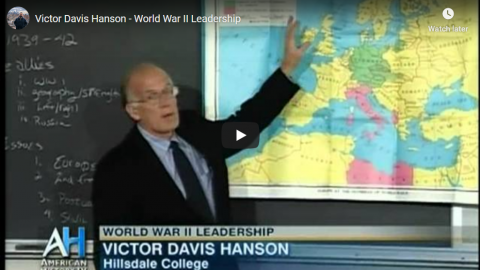Anang
Published 6 May 2012If you want to read more about WW2 leadership, read Andrew Roberts Masters & Commanders.
Victor Hanson, a professor emeritus of Classics at California State University, Fresno, lectured to a history class on Masters and Commanders at Hillsdale College. In this fall seminar in classical and military history Professor Hanson examined how leaders, both civilian officials and generals on the battlefield, conducted themselves in wartime. That day’s class focused on Franklin D. Roosevelt and Winston Churchill and how those very different American and British leaders learned to work together to defeat Nazi Germany.
Original link: http://www.c-spanvideo.org/program/29…
January 8, 2020
Victor Davis Hanson – World War II Leadership
Trump versus Iran (and significant parts of the US and western media)
Kurt Schlicter‘s take on the way President Trump has been breaking recent US habits in their dealings with Iran:

A burning vehicle at Baghdad International Airport following an American airstrike, early Friday, Jan. 3, 2020. The Pentagon said Thursday that the U.S. military has killed Gen. Qassem Soleimani, the head of Iran’s elite Quds Force, at the direction of President Donald Trump.
Photo from the Iraqi Prime Minister’s Press Office via Wikimedia Commons.
The Iranians had been getting uppity for a while, but then their punks killed an American contractor in a rocket attack on a U.S. base – and let’s not get distracted about whether we should still be there. They killed an American. We are there, and you don’t get a pass on murdering U.S. citizens because we may or may not have a good reason for them still being there. You get dead.
See, for too long we were asking the wrong question when tinpot dictators dared hurt Americans. We asked, “What would a gender-fluid Oppression Studies major at Yale do?” As I have observed before, the correct question is “WWJC do?” – “What would Julius Caesar do?”
Trump ordered hard hits at five Shiite militia weapon sites, and not with any warnings either. They got one of ours, we got about two dozen of theirs. Like the old joke about 1,000 lawyers at the bottom of the sea, that’s a good start.
The Iranians, whose Islamic Revolutionary Guard Corps is the ultimate source of most of the Shiite terror in the world, decided to respond in what they thought was a clever way: send a few thousand of their camo-clad dummies to attack the embassy and hope and pray a bunch of them got mowed down on camera. In the meantime, wave a lot of banners, burn some stuff, and pound on the reinforced glass for the press’s benefit.
But apparently, no one told the “mourners,” as the austere scholars at the endlessly useless New York Times dubbed the members of Islamic Antifa, that they were supposed to get smoked. They went home with the embassy unseized. Getting martyred en masse is not that much fun when you’re just one sucker out of dozens – heck, they may run of virgins.
See, Trump made it clear he was not playing. There would be no Benghazi II: Bagdad Boogaloo on his watch, and he acted well before 13 hours ran on the clock. Rejecting the elite’s preferred model of craven submission to every Third World cretin with a grievance and a camera, the Trump administration flew some Apache gunships over the crowd of unwashed morons, kicking off some flares, and generally sending the unequivocal message that if those SOBs had a problem, the AH-64s had a 30mm solution.
And then the administration sent in 100 Marines, about a company, on Ospreys as a quick reaction force and alerted the ready brigade at Ft. Bragg to start shutting 82nd Airborne Division paratroopers into theater.
Whatever the opposite of “stand down” is, Trump ordered that.
Chauchat: Shooting, History, and Tactics
Forgotten Weapons
Published on 14 Sep 2015http://www.patreon.com/ForgottenWeapons
Hammer price: $13,500The M1915 CSRG, commonly called the Chauchat after its primary designer, has a reputation as the worst gun ever put into military service. That reputation, however, is not deserved. It was not a great weapon, but it was a very serviceable gun for its day. The French needed a light automatic rifle *right now*, and needed it in large numbers. The Chauchat answered that call, and was used to great effect by many French soldiers.
The Chauchat’s poor reputation comes from a couple places, some justified and some not. First off, many US troops trained on M1918 Chauchats built in .30-06, which were poorly made and pretty darn bad guns. They were replaced by 8mm Lebel guns before going into combat, but the bad experiences of training stuck with many Americans. The biggest mechanical flaw in the Chauchat was its magazine. All automatic weapons are heavily dependent on good magazines, and the Chauchat used a magazine that was made of thin metal, easily damaged, and open on the sides for dirt and mud to enter. If the magazines were not treated well, the gun would become hopelessly useless.
In addition, many of the Chauchat guns in the United States today were deactivated at one time, and often badly reactivated. This has nothing to do with their original reliability, but it does a lot to perpetuate their reputation. This particular example is an original gun that does not appear to have ever been deactivated, and it ran flawlessly for me. It will be an excellent example for someone who can appreciate it!
QotD: Diversity in academia
Academia is simultaneously both the part of America that is most obsessed with diversity, and the least diverse part of the country. On the one hand, colleges bend over backwards to hire minority professors and recruit minority students, aided by an ever-burgeoning bureaucracy of “diversity officers”. Yet, when it comes to politics, they are not just indifferent to diversity, but downright allergic to it.
“America’s one-party state”, The Economist, 2004-12-02.





